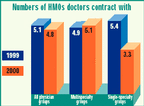Article
Practice Beat
Bioterrorism, RN Shortage, Malpractice, Capitation, Medicare, The Feds vs An FP
Practice Beat
Joan R. Rose
Bioterrorism: What doctors need to knowand how to find out
The CDC is warning physicians to be more vigilant in identifying illness patterns and diagnostic clues that may indicate an unusual infectious disease outbreaksuch as anthrax, plague, smallpox, botulism, or Ebola and other deadly viruses. Among the signs to look for: a geographic clustering of illness or an unusual age distribution of common diseaseschicken pox-like symptoms in adults, for instance. If you note such patterns, report them to your state or local health departments, the CDC says.
To teach doctors how to deal with biological and psychological effects of terrorism, Audio-Digest Foundation, a nonprofit arm of the California Medical Association, is offering a new audio program, "Bioterrorism: A Preparedness Guide for the Medical Profession." The 75-minute program can be heard free at www.audiodigest.org/bioterrorism, or you can go to the site to purchase an audiocassette or CD for $15. The fee includes CME credit.
Malpractice: Plaintiffs may face tougher juries
The terrorist attacks of Sept. 11 could have a profound effect on the US judicial system, according to a survey of jury consultants published in Lawyers Weekly USA.
Having seen people jump to death from the burning World Trade Center or crushed as the buildings collapsed on live TV, the consultants say, jurors' sense of pain and suffering may be dramatically altered. They may feel less sympathy for plaintiffs seeking damages for chronic pain, post-traumatic stress, or closed-head and soft-tissue injuries.
Capitation: Single-specialty groups are bailing out
Single-specialty physician groups have cut back significantly on the number of HMOs from which they accept capitation, according to a new study by Evergreen Re, a health care consulting and reinsurance firm. Inadequate reimbursement and lack of timely and relevant claims data from payers were among the reasons most frequently cited for canceling contracts.
The random telephone survey was limited to markets with 30 percent or greater health plan penetration. (For other data on doctors' managed care activity, see the Medical Economics Continuing Survey report in our next issue.)
Numbers of HMOs doctors contract with

The Feds vs An FP: A doctor's battle ends behind a judicial curtain
The five-year travail of Montana family physician Patsy M. Vargo, who was charged with fraudulent billing,* has been resolved. The doctor and the US Attorney for Montana settled a case involving the government's effort to recoup $37 million in overpayments and civil penalties.
Vargo's troubles began with a 1996 audit that resulted in criminal charges of two counts of fraud. Those charges were dropped, but a civil suit by the government followed. That suit has now been dismissed with prejudice; neither side can reopen it, and the terms of the settlement are sealed.
RN Shortage: Uncle Sam moves to cure the crisis
HHS will finance efforts to stem the growing nurse shortage and improve the quality of nursing services nationwide with a $20.1 million award to 82 colleges, universities, and other institutions. The money will be used to increase the number of RNs with bachelor's and advanced degrees, help diversify the nurse workforce by recruiting minorities, and prepare more nurses to serve in public health leadership roles.
Another $7.3 million will go toward repaying the educational loans of clinical care nurses who agree to work for two years in designated public or nonprofit health facilities facing a critical shortage of nurses.
Medicare: Where fraud police will focus in '02
Payments for evaluation and management codes total approximately $18 billion per year and account for almost half of Medicare spending for physician services. So it's no surprise that E&M coding will be a prime target for the HHS Office of Inspector General next year. In particular, the OIG will check whether physicians are following documentation guidelines and how carriers handle incorrect coding.
Other targeted areas are fees for consultation, beneficiaries' access to preventive services, and advance notification to beneficiaries when Medicare will not cover services.
*See "Why are the Feds hounding this FP?" July 23, 2001.
The author is a Contributing Writer.
Joan Rose. Practice Beat. Medical Economics 2001;22:17.





